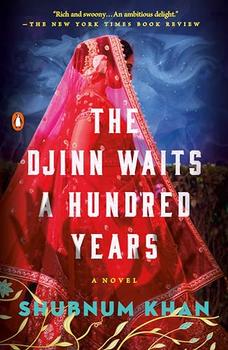Summary | Excerpt | Reading Guide | Reviews | Beyond the Book | Readalikes | Genres & Themes | Author Bio

A Novel
by Shubnum KhanPrologue
1932
In an old wardrobe a djinn sits weeping.
It whimpers and murmurs small words of complaint. It sucks its teeth and berates the heavens for its fate. It curses the day it ever entered this damned house. It closes its eyes and tries to imagine a time before it came here, before it followed the sound of stars from the shore, before the world turned dark and empty.
Something thuds somewhere and the djinn is drawn from its misery by a commotion happening outside. It stops to listen and sounds begin to emerge; doors bang, windows shut, and things are thrown about. There are shouts as orders are given and people hurry through passages. They run up and down and bump heavy things along the stairs.
The djinn pauses, then it uncurls its limbs, swings open the cupboard, and steps out.
There is the patter of footsteps, then the front door slams downstairs and everything is suddenly still.
The djinn steps into the passage and looks around curiously. The floor is scattered with clothing and bedding. It wanders into the rooms; in a child's bedroom, next to a smoking fireplace, twenty-seven plastic soldiers wait for a French army to advance. In a woman's bedroom, a silk camisole slips off a swinging hanger in a closet.
The djinn creeps downstairs. In the kitchen, a dish of potatoes soaks beneath a dripping tap. Steam rises from a set-aside kettle. A basket of fresh laundry waits to be ironed.
The djinn wanders into the long dining room, among the high-backed chairs, and peers into the entrance hall where a grandfather clock ticks loudly. It pulls open the heavy front doors and looks into the bright, clear light of early morning. The stone stairs are strewn with opened trunks and scattered books. The driveway lies empty. The djinn steps outside into the pale pink light and looks to the still, shimmering ocean.
It turns to the looming house behind and wails.
One
2014
No one in Durban remembers a Christmas as hot as this.
The heat is a living breathing thing that climbs through windows and creeps into kitchens. It follows people to work and at queues in the bank and on trains home. It crouches in bedrooms, growing restless until at night in fury it throttles those sleeping, leaving them gasping for breath. It sweeps through the streets and bursts open pipes, smashes open green guavas, and splits apart driveways. It burns off fingerprints and scorches hair and makes people forget what they are doing and where they are going so that they wander around beating their heads.
At the taxi rank in town people wave newspapers under their arms and wipe their foreheads with pamphlets that promise to bring back lost lovers. Witch doctors' phone numbers drip down their temples and into their pockets in inky-blue puddles. Bananas blacken in the sun on pavement tables. The humidity grows and strangers are drawn to one another without meaning to and they cling together in a sweaty unhappy mess.
Out in the suburbs people sit in their inflatable pools with party hats and sip cheap wine from plastic cups. They eat bunches of litchis and hunks of watermelon and burn meat black on the braai. Maidless madams push hair out of their eyes as they hang up washing and count down to the end of the holidays. Dirty dishes pile up in sinks, garbage bags burst open with maggots.
At the coast the sky opens wide and burns the sea white. Little children in multicolored swimsuits skip across the hot sand and shriek in thrilled agony. Families with pots of biryani and lukewarm Coke sit under small umbrellas fanning themselves with Tupperware lids as they dish rice onto paper plates.
The pier stretches on to eternity like a foreboding finger.
Sana Malek winds down her window and searches for a breeze. The dark curtain of hair flies off her neck to reveal her mother's chin, and she turns this way and that as she struggles to make it her own. She is neither girl nor woman, hovering in that space between the two, where at the edge of her thoughts, curling at the eaves, is the glimpse of a fluttering light that promises something wonderful: a knowledge that the world is going to change.
Excerpted from The Djinn Waits a Hundred Years by Shubnum Khan. Copyright © 2024 by Shubnum Khan. Excerpted by permission of Viking. All rights reserved. No part of this excerpt may be reproduced or reprinted without permission in writing from the publisher.
Your guide toexceptional books
BookBrowse seeks out and recommends the best in contemporary fiction and nonfiction—books that not only engage and entertain but also deepen our understanding of ourselves and the world around us.